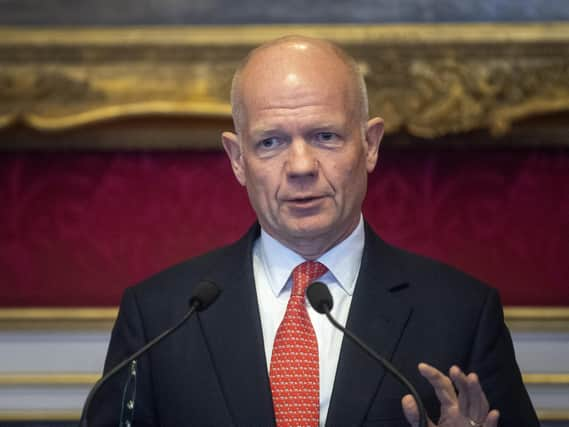William Hague and education should be at heart of 'levelling-up' - Jayne Dowle


The Rotherham-born former Conservative party leader has been sharing his experiences of growing up in South Yorkshire and achieving a place to study at Oxford University in the late 1970s.
His are not the ramblings of a middle-aged man nostalgic for a gilded youth. It was tough growing up in South Yorkshire 30 or so years ago, but I daresay it is tougher now.
Advertisement
Hide AdAdvertisement
Hide AdLord Hague’s clear analysis of what Boris Johnson must address in the communities which have been left behind should be heeded by all who profess a commitment to equality.
We are to expect a big speech on education soon from the Prime Minister – a one-off chance to put this whole issue at the heart of his levelling-up agenda.
I sincerely hope he takes the time to consider the content carefully instead of bluffing his way through with customary soundbites and rhetoric.
Raising aspiration at post-16 should be at the mantra. I’ve seen, at the academy school which has educated both my children, what a difference committed teaching staff can make. The big issue, I think, is what happens next.
Advertisement
Hide AdAdvertisement
Hide AdUniversity is not the answer for every teenager. Indeed, my own son, Jack, leaves college this week with (hopefully) a diploma in broadcast journalism and an ambition to seek an apprenticeship rather than a degree.
I’d argue that for too long now – since Tony Blair’s time in office, at least – the education argument has focused erroneously on graduate vs non-graduate.
This runs counter to the Government’s refusal to find alternative ways for degrees to be funded – and doesn’t join up with the much-heralded roll-out of post-16 apprenticeship schemes.
Education policy lacks cohesion and has been neglected since Brexit began to dominate the political agenda. In addition, during the pandemic, it has suffered from a series of fire-fighting measures inexpertly handled by Gavin Williamson, the Education Secretary.
Advertisement
Hide AdAdvertisement
Hide AdAt least Michael Gove, when he did the job, had a series of big ideas. Interestingly, it’s worth noting that like Lord Hague – and me – he came from a modest background himself and ended up studying at Oxford.
I daresay that despite our political differences, we would all agree on one thing; education can be, and should be, a transformative experience, opening up opportunities and allowing individuals to capitalise on their strengths.
It is actually, at its core, a simple theory. And it works. This approach runs through the independent schools sector, enabling fortunate privately-educated pupils and equipping them with self-confidence to make the best choices instead of accepting second-best. The challenge now is how to make this work in the state sector.
I followed Lord Hague in the mid-1980s, when I left sixth-form college in Barnsley to study English Literature and Language at Keble College, Oxford. I am not saying for a moment that Oxbridge is the right environment for every able young person. Again, this attitude creates yet more segmentation.
Advertisement
Hide AdAdvertisement
Hide AdHowever, I cannot express strongly enough how this opportunity completely and utterly changed my life. At the age of 14, I barely attended my comprehensive school. I suffered, I suspect, from what is now diagnosed as ‘schoolphobia’ or ‘school refusal’.
I left with a scraping of O-Levels, and had to re-sit maths (twice). I went to our local sixth-form college with the vague idea of studying fashion journalism. However, thanks to the wise intervention of the deputy headmistress, the late Miss Kate Taylor, I ended up sitting the Oxford entrance exam for English and passing the interview, despite mis-pronouncing ‘pheasant’ as ‘peasant’ when asked to discuss a Sylvia Plath poem. I still find irony in that.
The day the college rang with the offer of a place, my grandparents were at our house for tea. My grandad, a retired miner who had left school at 14 in 1916, cried. We all cried.
I’m crying now, as I write this, because I am reminded every day when I sit down to work as a journalist of how transformative education can be, how it took a confused girl from Barnsley and gave her a chance.
Advertisement
Hide AdAdvertisement
Hide AdThis is the point that many people miss, including out-of-touch politicians. Education isn’t just about what happens through childhood and young adulthood.
It continues to shape your life, your work, your contribution to society and the way you influence your own children and those around you. For all these reasons and more, I agree with Lord Hague.
If the Prime Minister is serious about levelling-up, education must be at the heart of it all.
Comment Guidelines
National World encourages reader discussion on our stories. User feedback, insights and back-and-forth exchanges add a rich layer of context to reporting. Please review our Community Guidelines before commenting.